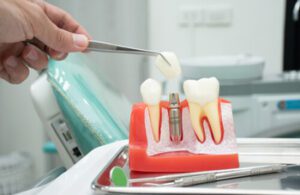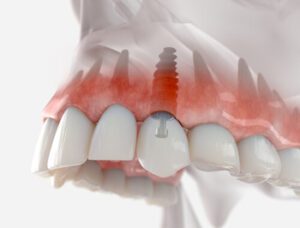Dental implants have become a popular and effective solution for replacing missing teeth. They provide a permanent and natural-looking replacement that can restore function and aesthetics. With the rise of patients considering an overseas dental implant, Thailand has become one of the many options available, emerging as a notable destination due to its lower costs.
This comprehensive article will explore the intricacies of dental implants, the reasons behind the cost differences between treatments in Thailand and Australia, and the potential risks associated with dental tourism. We’ll also provide insights into what you can expect from dental implant procedures in Australia and offer practical tips for making your dental implant procedure more affordable locally.
What Are Dental Implants?
Dental implants represent a modern solution for replacing missing teeth, offering a long-term alternative that closely mimics the appearance and function of natural teeth. To fully appreciate the value and effectiveness of dental implants, it’s essential to understand their core components, the procedure involved, and the wide range of benefits they provide.
Components Of A Dental Implant
A dental implant comprises several integral parts that work harmoniously to replicate the function and appearance of a natural tooth. Each component serves a specific purpose in ensuring the implant’s success and longevity.
Implant Post

Abutment
The abutment is a small connector piece that attaches to the implant post once it has fully integrated with the jawbone. Its primary function is to bridge the gap between the implant post and the artificial tooth (crown). The abutment is crucial as it holds the crown securely in place and ensures proper alignment with the surrounding teeth. It is custom-made to fit precisely, providing a sturdy base for the final restoration.
Crown
The crown is the visible part of the dental implant that mimics the natural tooth’s appearance. Made from materials such as porcelain, ceramic, or composite resin, the crown is designed to integrate precisely with your existing teeth. It is custom-fabricated to match the colour, shape, and size of your natural teeth, ensuring a natural-looking result. The crown is affixed to the abutment and serves as the functional and aesthetic component of the implant.
Benefits Of Dental Implants
Dental implants offer numerous advantages over other tooth replacement options, like bridges or dentures. Their benefits extend beyond aesthetics, impacting oral health and daily functionality.
Durability
One of the most significant benefits of dental implants is their durability. With proper care and maintenance, implants are designed to last many years, often for a lifetime. The titanium implant post integrates with the jawbone, providing a tough and long-lasting foundation. This longevity makes dental implants a cost-effective solution in the long run.
Natural Appearance
Dental implants closely resemble natural teeth, providing an aesthetically pleasing result. The custom-made crown ensures the implant connects properly with your existing teeth, restoring your smile’s natural look. This natural appearance boosts self-confidence and allows you to interact socially without concerns about visible gaps or artificial-looking replacements.
Improved Function
Implants restore full chewing function, allowing you to eat and speak comfortably. Dental implants are fixed in place, unlike removable dentures, which can shift or cause discomfort. This stability means you can enjoy your favourite foods without restrictions and speak clearly without worrying about appliances shifting.
Bone Preservation
Another critical advantage of dental implants is their role in preserving jawbone density. When a tooth is lost, the underlying jawbone can deteriorate over time due to a lack of stimulation. Dental implants provide the necessary stimulation to the jawbone, preventing bone loss and maintaining the natural contour of your face. This preservation helps avoid the sunken appearance that can occur with missing teeth.
Enhanced Comfort
Dental implants offer superior comfort compared to removable appliances like dentures. Since implants are securely anchored in the jawbone, they eliminate the discomfort and inconvenience associated with dentures, such as slipping, clicking, or sore spots. This fixed solution ensures that you can go about your daily activities with confidence and ease.
By understanding the components and benefits of dental implants, you can make an informed decision about whether this treatment is the right choice for you. Implants not only provide a practical solution for missing teeth but also offer long-term advantages that enhance your overall oral health and quality of life.
Why Is Dental Implant Treatment Cheaper In Thailand?
Many individuals explore Thailand for dental implant procedures due to the significant cost savings. Understanding the factors contributing to these lower costs can help you make an informed decision. Here, we examine the primary reasons for the reduced price of dental implants in Thailand.
Material Costs
One of the primary reasons dental implants in Thailand are more affordable is the lower cost of dental materials. This reduction is due to the local availability of materials and lower manufacturing costs. While this can lead to substantial savings, it is crucial to ensure that the materials used are of high quality. Substandard materials can compromise the long-term success of the implant.
Currency Exchange Rate
The value of the Thai baht compared to the Australian dollar plays a significant role in the cost differences. A favourable exchange rate makes Australian patients see that they might benefit from lower prices when converting their currency.
Different Quality Standards
Quality standards for dental care can vary significantly between countries. While some clinics in Thailand adhere to international standards, others may not. In Australia, dental practices are generally subject to rigorous quality and safety regulations, which can contribute to higher treatment costs.
Experience Of Dentists
The experience level of dentists in Thailand can vary. Some may have extensive training and experience, while others may not. In Australia, dentists typically undergo comprehensive training and adhere to strict professional standards, which can influence the cost of treatment. Having dentists with verified credentials and experience is crucial to ensuring that you receive high-quality treatment.
Technology And Facilities
The level of technology and facilities in dental clinics can differ greatly. While some Thai clinics offer state-of-the-art technology, others may use outdated equipment. In Australia, dental clinics often invest in state-of-the-art technology, which can enhance the precision and success of dental implant procedures, contributing to higher costs. Advanced technology can improve the precision and success rates of dental implant procedures.
Risks Of Dental Tourism
Dental tourism can offer appealing cost advantages, but it also comes with inherent risks that are important to recognise:
Post-Surgical Care
The complexities of managing post-surgical care in a different country can pose significant challenges. The intricacies of coordinating follow-up and addressing complications from afar can influence the outcome of your dental treatment and the ease of your recovery process.
Communication Barriers
Language differences and varying medical standards can lead to potential misunderstandings regarding treatment procedures and care protocols. Such communication barriers may impact the clarity of your treatment plan and the overall patient experience.
Legal And Insurance Issues
Navigating legal and insurance matters across international borders adds another layer of complexity. Handling rights, clinic policies, and insurance coverage from abroad can introduce complications, particularly if unexpected issues arise during or after your treatment.
What To Expect When Getting Dental Implants In Australia
Dental implant procedures in Australia are conducted under strict regulatory standards to ensure high-quality care. Understanding what to expect during the process can help you prepare for and make informed decisions about your treatment.
Initial Consultation
The process begins with a comprehensive consultation, during which your local dentist evaluates your oral health, discusses treatment options, and creates a personalised plan. This may include diagnostic imaging, such as X-rays or CT scans, to assess the condition of your jawbone and plan the implant procedure. During the consultation, you will discuss your goals, expectations, and any concerns you may have.
Pre-Surgical Preparations
Before the implant surgery, you may need preparatory procedures, if necessary. These preparatory steps ensure that your jawbone is in optimal condition for the implant placement and contribute to the overall success of the procedure.
Implant Post Placement
During the implant procedure, the titanium dental implant posts are surgically inserted into the jawbone under local anaesthesia. Patients may experience mild discomfort during recovery. Implant posts serve as the foundation for the artificial tooth.
Healing Period
After the implant placement, a healing period of several months is required for the implant to integrate with the jawbone. This process, known as osseointegration, involves the bone growing around the implant and securing it in place. During this time, you must follow specific care instructions, such as maintaining good oral hygiene and attending follow-up appointments, to oversee the progress and ensure accurate integration.
Final Restoration
Once the implant has fully integrated with the jawbone, the final restoration is placed. This involves attaching the abutments and custom-made crowns or dental implant bridges to the implant posts. The final restoration completes the replacement of your missing teeth and provides a natural appearance and function. Your dentist will ensure that the crown fits comfortably and matches the colour and shape of your natural teeth.
Additional Procedures That May Add To The Cost

Bone Grafting
Bone grafting is required when there is insufficient bone volume or density in the jaw to support an implant. This procedure involves placing graft material to stimulate new bone growth and is necessary for creating a stable foundation for the implant. The cost varies based on the type of graft material used and the extent of the procedure.
Sinus Lift
A sinus lift is performed to add bone to the upper jaw in the area of the molars and premolars, where the sinus cavity is located. This procedure is necessary if the bone height is inadequate for implant placement. Due to the innovative techniques and materials involved, the cost of a sinus lift can be significant.
Extraction Of Existing Teeth
Tooth extraction may be required if a damaged or decayed tooth needs to be removed before placing an implant. The cost of extraction depends on the complexity of the procedure and whether it leads to additional treatments like bone grafting.
By understanding these potential additional costs, you can better prepare for the financial aspects of your dental implant procedure and ensure a successful outcome.
Post-Surgical Risks Of Low-Quality Treatment Overseas
Opting for lower-quality dental implant treatments abroad can lead to several risks. Understanding these risks can help you make a more informed decision about your dental care and ensure you receive high-quality treatment.
Dental Implant Infections
Infections are a significant risk associated with low-quality implants, particularly if the procedure is performed in substandard conditions. Infections can cause pain, swelling, and implant failure. Ensuring that the clinic follows strict infection control protocols and uses high-quality materials can help reduce the risk of infection.
Implant Failure
Low-quality implants or improper placement can increase the risk of implant failure, necessitating additional procedures and costs to correct the issues. Implant failure can occur due to factors such as inadequate bone support, infection, or mechanical issues with the implant. Ensuring that you choose a reputable clinic with experienced professionals can help mitigate this risk.
Bone Loss
Inadequate treatment or follow-up care can lead to bone loss around the implant site, compromising the implant’s stability and leading to further complications. Bone loss can result from poor implant placement or infection. Proper care and monitoring are essential to maintain bone health and ensure the long-term success of the implant.
Gum Disease
Poor-quality implants or inadequate hygiene can result in gum disease, affecting the implant’s success and overall oral health. Gum disease can lead to inflammation, infection, and implant failure. Regular dental check-ups and proper oral hygiene are crucial for minimising the risk of gum disease and ensuring the health of your implants.
How To Make Your Dental Implant Procedure Affordable In Australia
While dental implants may be more affordable in Thailand, there are several ways to make the procedure more affordable in Australia without compromising on quality. Exploring these options can help you achieve a cost-effective solution for your dental needs.
Dental Insurance And Payment Plans
Many dental clinics offer payment plans and accept dental insurance to help manage the cost of treatment. Check with your insurance provider to understand your coverage and explore payment plan options available at local clinics. Payment plans can spread the cost of treatment over time, making it more manageable.
Promotions And Discounts
Many dental clinics run promotions and offer discounts on dental implants or related procedures. Keep an eye out for special offers and discounts that can reduce the cost of your treatment. Contact local clinics to enquire about any available promotions and take advantage of these opportunities.
How To Choose The Right Dental Implant Dentist In Australia
Choosing the right dental implant dentist is a pivotal decision that can significantly impact the success of your treatment and your overall experience. Here’s a refined guide to selecting an experienced dental implant expert in Australia:
Credentials And Qualifications
Opt for a dentist with impeccable credentials and extensive training in implant dentistry. Look for professionals affiliated with prestigious organisations. These affiliations are a mark of excellence, demonstrating a commitment to advanced education and adherence to stringent industry standards.
Experience And Expertise
Seek out a dentist renowned for their extensive experience in dental implants. A seasoned professional will possess a rich portfolio of successful implant procedures and expertise with various implant systems and techniques. Enquire about their experience with the specific type of implant you require and request to review case studies or before-and-after photos to gauge their proficiency.
Technology And Facilities
Examine the dental clinic’s technological prowess and facility standards. Cutting-edge practices that invest in advanced technologies, such as 3D imaging and digital implant planning, often deliver superior precision and outcomes. Ensure the clinic is equipped with the latest tools and techniques to optimise the success of your implant procedure.
Patient Reviews And Testimonials
Dive into dental implant reviews from patients to uncover real-life experiences and satisfaction levels. Positive feedback and high ratings from previous patients can indicate a dentist’s calibre. Look for reviews highlighting their expertise in dental implants to ensure you choose a professional with a proven track record.
Consultation And Communication
A comprehensive consultation is essential. Use this opportunity to evaluate the dentist’s communication skills and their ability to address your questions and concerns. An experienced dentist will explain clearly, discuss potential risks, and outline the expected outcomes, ensuring you are well-informed and confident in your treatment plan.
Frequently Asked Questions
What should I do if I experience complications after a dental implant procedure?
Contact your dentist immediately if you experience complications such as pain, swelling, or infection after a dental implant procedure. They will assess the issue and provide the necessary treatment or adjustments to ensure the success of your implant.
Are there different types of dental implants available?
Yes, there are several types of dental implants, including single implants, multiple implants, and implant bridges. The type used will depend on factors such as the number of missing teeth and the condition of your jawbone.
How long does the healing process take after dental implant surgery?
The healing process typically takes several months, during which the implant integrates with the jawbone (osseointegration). The duration can vary depending on individual factors, such as bone quality and overall health.
What can affect the success of a dental implant?
Factors that can affect the success of a dental implant include the quality of the implant materials, the skill of the dentist, the patient’s bone density and oral health, and adherence to post-surgical care instructions.
Balancing Quality And Cost In Dental Implant Treatment

By understanding what to expect from dental implant procedures and exploring ways to make them more affordable in Australia, you can achieve a positive outcome and enjoy the benefits of a restored smile.
Are you ready to explore your options for dental implants? Contact Port Macquarie Dental Centre, Port Macquarie, NSW, today at (02) 6105 9853. We will provide you with detailed information tailored to your needs and help you plan the best possible approach to your dental health.
Note: Any surgical or invasive procedure carries risks. Before proceeding, you should seek a second opinion from an appropriately qualified health practitioner.
Sources:
British Dental Association. “Dental Tourism: Patients Need to Know the Risks.” British Dental Assocation, 14 July 2022, www.bda.org/news-and-opinion/news/dental-tourism-patients-need-to-know-the-risks. Accessed 29 July 2024.
Colgate. “Understanding Bone Grafts for Dental Implants.” Colgate®, 9 Jan. 2023, www.colgate.com/en-us/oral-health/implants/bone-graft-for-dental-implants-understanding-the-possibility#. Accessed 29 July 2024.
“Dental Implant Surgery.” Mayo Clinic, 29 Jan. 2019, www.mayoclinic.org/tests-procedures/dental-implant-surgery/about/pac-20384622. Accessed 29 July 2024.
“Dental Implants: What You Should Know.” U.S. Food And Drug Administration, 29 Oct. 2021, www.fda.gov/medical-devices/dental-devices/dental-implants-what-you-should-know. Accessed 29 July 2024.
HBF Health Insurance. “How to Afford the Cost of Dental Treatment in Australia.” HBF Health, 3 Jan. 2023, www.hbf.com.au/blog/how-to-afford-the-cost-of-dental-treatment-in-australia. Accessed 29 July 2024.
Howley, Elaine K., and Patric Cohen. “How to Find a Good Dentist.” US News & World Report, 20 Apr. 2022, health.usnews.com/health-care/patient-advice/articles/how-to-find-a-good-dentist. Accessed 29 July 2024.
Lamb, Sandra. “When Dental Implants Go Wrong.” AARP, 13 Nov. 2020, www.aarp.org/health/conditions-treatments/info-2020/dental-implants-danger.html. Accessed 29 July 2024.
“Policies, Codes, Guidelines and FAQ.” Dental Board AHPRA, www.dentalboard.gov.au/Codes-Guidelines.aspx. Accessed 29 July 2024.
Yang, Yong, et al. “The Survival Rates and Risk Factors of Implants in the Early Stage: A Retrospective Study.” BMC Oral Health, vol. 21, no. 1, June 2021, https://doi.org/10.1186/s12903-021-01651-8.

